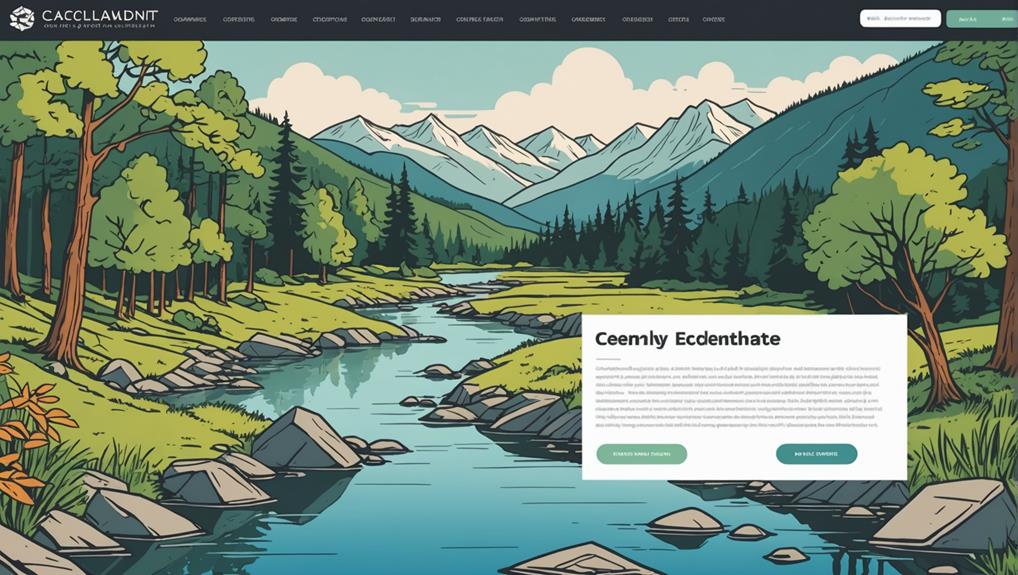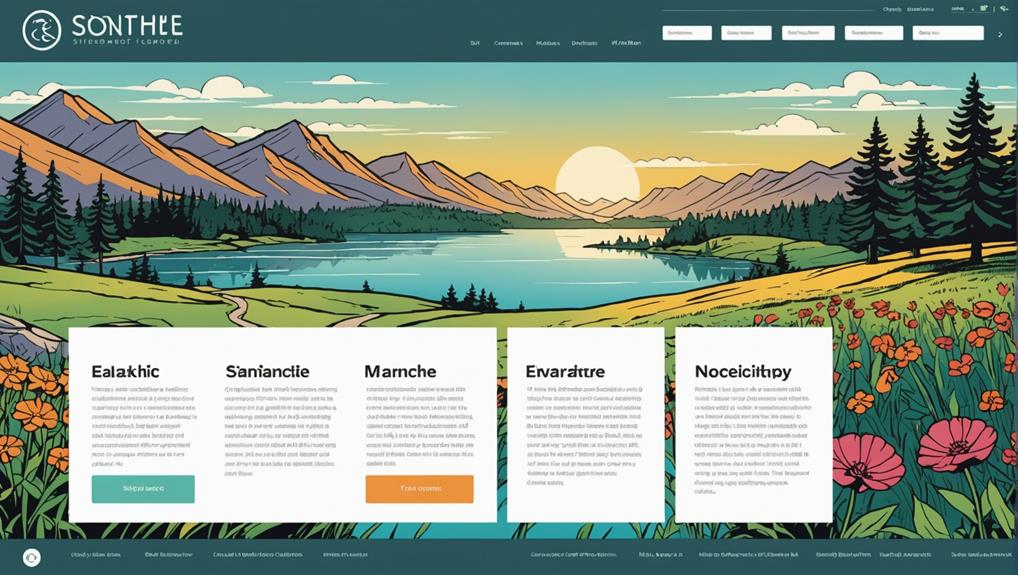
Creating a professional website for your counseling practice helps you connect with clients and build trust. Start by ensuring easy navigation, so visitors can quickly find services and schedule appointments. Use calm colors and inviting images to create a comforting atmosphere. Show your credentials with clear bios and nice headshots, as many clients appreciate this reassurance. Incorporate helpful resources like blogs or videos to share your expertise. Finally, don't forget strong calls-to-action, which encourage people to reach out. Each of these features can make a real difference, and there's so much more to explore on this topic!
Key Takeaways
- Implement intuitive navigation and streamlined appointment scheduling features to enhance user experience for potential clients.
- Use calming visuals, consistent branding, and clear typography to create a welcoming and professional atmosphere.
- Highlight provider credentials, personal bios, and client testimonials to build trust and foster connections with visitors.
- Develop a comprehensive content library with valuable resources to showcase expertise and encourage client engagement.
- Incorporate strong calls-to-action strategically to increase engagement and facilitate easy scheduling of consultations.
Importance of a Professional Online Presence

In today's digital age, having a professional online presence is essential for attracting new clients to your counseling practice. A well-designed website not only showcases your services but also builds trust with potential clients. It's surprising, but research shows that 72% of new websites fail without clear goals. So, setting clear objectives when developing your site is vital. Implementing effective CRM functionalities can streamline client interactions and enhance your service delivery.
Enhanced visibility through effective SEO strategies means more people can find you. When they do, a clear call to action—like an easy way to contact you—can lead to higher engagement. Make sure your contact information is easy to find; this small step can make a big difference!
Your website should reflect your qualifications and credibility, which fosters trust and enhances effective communication. When clients feel confident in your expertise, they're more likely to reach out. Plus, a professional online presence connects you with existing patients while providing convenient access to information.
Client Expectations and User Experience
Meeting client expectations begins with delivering an exceptional user experience on your website. When potential clients visit your therapy practice's site, they want to find information quickly and easily. Intuitive navigation helps them locate services, contact details, and even HIPAA compliance information without any hassle.
A well-designed website can make all the difference. Over 70% of clients prefer sites that offer streamlined appointment scheduling, so including this feature is essential. It shows you understand their needs and are ready to help. Engaging visuals paired with expert content can also enhance your online presence, making it more appealing to visitors.
Remember, clear and concise descriptions of your services improve client understanding. By effectively communicating what you offer, you help clients identify their specific therapy needs, making them feel more confident in reaching out.
Creating a positive user experience isn't just about looks; it's about how clients feel when they interact with your site. By focusing on these elements, you're not only meeting client expectations but also fostering stronger connections. Your website can be a welcoming space, encouraging potential clients to take that important first step toward healing.
Building a Comprehensive Content Library

As you build an extensive content library for your counseling practice, consider how valuable resources like webinars, podcasts, and case studies can showcase your expertise. These tools help potential clients understand your approach to therapy and how you can address their unique needs. Including infographics can simplify complex topics, making information easier to digest and more engaging.
A user-friendly content index is essential too. It allows visitors to quickly find what they're looking for, encouraging them to explore more of your resources. Regularly updating your educational materials not only keeps your content fresh but also establishes you as a thought leader in the mental health field. This shows your commitment to client education and support.
Encouraging visitors to interact with your content—like leaving comments or sharing articles—can enhance community involvement. This interaction builds trust and rapport with potential clients, making them feel more connected to your practice. By creating a rich content library filled with helpful resources, you'll foster a welcoming atmosphere where individuals feel valued and understood. Remember, the more you share, the more you can help others on their journeys to healing.
Utilizing Website Builders for Accessibility
Creating a website for your counseling practice doesn't have to be overwhelming. With user-friendly design templates from website builders like Wix or Squarespace, you can set up your site quickly and cost-effectively, often for just $5 to $15 a month. Plus, these platforms let you customize your site easily, so it truly reflects your unique style and approach to therapy, making it accessible to everyone who might need your help.
User-Friendly Design Templates
A well-designed website can be the cornerstone of a successful counseling practice, and user-friendly design templates from website builders like Squarespace and Wix make this achievable for anyone. These platforms offer templates specifically crafted for therapy websites, allowing you to set up your online presence quickly, even if you don't have technical skills.
With the easy drag-and-drop functionality, you can customize your site's layout and content, making it truly reflect your unique style and services. Imagine having a professional website that attracts clients without the stress of complicated coding! Plus, many website builders come equipped with integrated SEO tools, which means potential clients can find you more easily through search engines.
Mobile-responsive templates guarantee your counseling website looks great on any device, enhancing the user experience. This is important because you want clients to feel comfortable and engaged when they visit your site. Additionally, features like appointment scheduling and contact forms streamline client interactions, making your online presence not just professional, but functional too. Embracing these user-friendly design templates can truly elevate your counseling practice!
Cost-Effective Setup Options
Setting up a professional website for your counseling practice doesn't have to break the bank. You can explore cost-effective setup options by using website builders like Squarespace or Wix. These platforms offer user-friendly templates for as low as $5 to $15 per month. Plus, they include hosting, registration, and 24/7 customer support, which makes your life a whole lot easier.
With a DIY approach, you can save thousands compared to custom websites that can cost anywhere from $500 to $5000. Most website builders feature drag-and-drop functionality, so you can customize your site without needing to know complicated coding. This means you can focus on what really matters—your clients!
Additionally, many website builders come with built-in SEO tools. These tools can boost your online visibility, helping potential clients find your counseling services more easily. Imagine how rewarding it would feel to see your practice grow because you took this smart, budget-friendly step!
Customization Flexibility Available
How can you guarantee your counseling website stands out while meeting your specific needs? The answer lies in customization flexibility. With website builders like Squarespace and Wix, you can create a stunning therapist website without needing to be a tech expert. These platforms offer user-friendly templates and drag-and-drop features, making it easy to design a private practice website that truly reflects your unique brand.
You'll find plenty of customization options to tailor the design, layout, and functionality just the way you want it. Plus, many of these builders come with integrated services like hosting and domain registration, which simplifies the process and can help you save money.
Another vital feature is responsive design. This means your website will look great on any device, whether your clients are browsing on a computer or their smartphones. As more people search for services on mobile, this is essential for your web presence.
Establishing a Calming Visual Tone

Creating a calming visual tone for your counseling website is essential in attracting potential clients and fostering a sense of trust. You want your site to feel welcoming, so consider using tranquil colors like soft earthy tones and shades of blue. These hues promote calmness and create a soothing atmosphere for visitors.
Incorporating high-quality imagery, such as nature scenes or serene spaces, can evoke feelings of safety and trust. Remember, first impressions matter! By showcasing comforting visuals, you can align with your clients' emotional needs.
Choosing legible fonts is equally important. Easy-to-read text enhances accessibility and guarantees that your essential information is clearly communicated without causing visual strain.
Consistent use of tranquil colors and comforting imagery throughout your site helps establish a professional brand identity. This consistency resonates with your therapeutic goals, making it easier for clients to connect with you.
When your website looks inviting and feels calm, you set the stage for positive interactions. All these elements work together to create the calming visual tone that will make your clients feel at ease from their very first click.
Showcasing Provider Credentials
When you showcase your credentials on your website, you're not just sharing your qualifications; you're building trust with potential clients. A "Meet the Provider" section can make a big difference, as personal bios and professional photos help visitors feel a connection to you right away. Plus, being transparent about your education and experience reassures clients they're choosing someone who truly knows their stuff.
Importance of Credentials
Establishing trust is essential in the counseling field, and showcasing your credentials on your website can greatly enhance that trust. When potential clients see your qualifications, they feel more confident in reaching out. Research shows that 67% of clients consider educational background vital when choosing a therapist. Here are four key reasons why you should highlight your credentials:
- Expertise: Displaying your licenses and certifications sets you apart and shows you're qualified in specific areas of mental health.
- Transparency: Being open about your credentials reassures visitors of your qualifications, which can lead to more inquiries.
- Trust: Clients are more likely to trust a therapist who openly shares their educational background and training.
- Client Testimonials: Including testimonials alongside your credentials emphasizes your effectiveness and highlights real-world satisfaction from former clients.
Personalization Through Bios
A well-crafted bio on your counseling website can considerably enhance the connection you have with potential clients. When clients are looking for help, they want to know who you are and what you stand for. Your bio should showcase your professional credentials, like degrees and certifications, which highlight your expertise. This sets you apart from others and builds trust.
Include a personal story in your bio. This can make you more relatable, helping potential clients feel comfortable even before their first visit. Sharing your therapeutic approach and philosophy can also guide clients in deciding if you're the right fit for them.
Don't forget a high-quality professional headshot. It adds warmth and professionalism to your therapist website, making it feel inviting.
Visual Representation of Trust
Building trust with potential clients starts with showcasing your credentials clearly on your website. When clients see your qualifications, it reassures them that they're in capable hands. Here are four ways to visually represent your trustworthiness:
- Professional Bios: Write engaging bios that tell your story, detailing your background and experiences. This can help clients connect with you personally.
- Headshots: Include warm, inviting headshots to make your presence feel more welcoming. A friendly face can ease anxiety for new clients.
- Certification Badges: Display logos or badges of your certifications prominently. This visual cue reinforces your qualifications and commitment to excellence.
- Special Training: Highlight any unique therapeutic techniques you specialize in. This shows your expertise in specific areas, attracting clients who need your skills.
Importance of Strong Calls-to-Action

Harnessing the power of strong calls-to-action (CTAs) can greatly impact your counseling practice's online success. These CTAs guide potential clients toward the next steps you want them to take, like scheduling an initial consultation or filling out a contact form. When you use compelling language, such as "Schedule Your Free Consultation Today!" it encourages visitors to act right away, improving your chances of converting them into clients.
Websites with strategically placed CTAs can see a massive increase in engagement. In fact, effective CTAs can boost click-through rates by as much as 371%! This means that when you make your CTAs visible and accessible, especially on high-traffic pages, you maximize user interaction and potential client inquiries.
Don't forget to test different variations of your CTAs. Experiment with colors, placements, and wording to see what resonates best with your audience. By focusing on strong calls-to-action, you're creating a website for your private counseling practice that not only looks professional but also drives results. Remember, each CTA is a stepping stone toward building meaningful connections with those who need your help.
Leveraging Social Media for Engagement
Many therapists underestimate the power of social media in connecting with potential clients and enhancing their practice's visibility. By actively engaging with your audience, you can build trust and foster a sense of community. Here are four impactful ways to leverage social media effectively:
- Share Expert Insights: Post articles and tips related to therapy. This not only showcases your expertise but also encourages potential clients to reach out for help.
- Collaborate with Influencers: Partnering with trusted figures in the mental health field can broaden your reach. Their endorsement can attract new clients who trust their recommendations.
- Use Social Media Buttons: Make it easy for visitors to share your content. When they do, your practice's visibility can expand to their networks, reaching more potential clients.
- Engage Regularly: Keep your social media accounts active with informative posts. This consistent interaction helps maintain interest and strengthens your professional reputation.
Frequently Asked Questions
How to Make a Mental Health Website?
To make a mental health website, focus on website design and content strategy that enhances user experience. Prioritize mobile responsiveness, implement SEO optimization, and encourage client engagement through clear calls-to-action throughout your site.
How to Create a Website for a Psychologist?
Creating a website for a psychologist's like crafting a welcoming space. Focus on website design, integrate client resources, outline payment options, and employ SEO strategies. Prioritize content creation and accessibility features for an inviting experience.
How Do I Create a Counselling Profile?
To create an effective counseling profile, focus on crafting a compelling bio that highlights your credentials and resonates with your target audience. Prioritize personal branding and website aesthetics for better engagement and connection.
Final Thoughts
Creating a professional website for your counseling practice isn't just about looking good; it's about connecting with your clients. By focusing on user-friendly design, showcasing your credentials, and providing valuable content, you're building trust. Think of your website as a warm virtual welcome mat, inviting clients in. Remember, every small detail counts, so embrace the challenges of building it. With patience and creativity, you'll turn your online space into a comforting place where healing begins.
- How to Track and Improve Website Conversion Rates - 14/01/2026
- Best Practices for Call-to-Action Buttons - 09/01/2026
- The Psychology of Colours in Web Design - 04/01/2026




